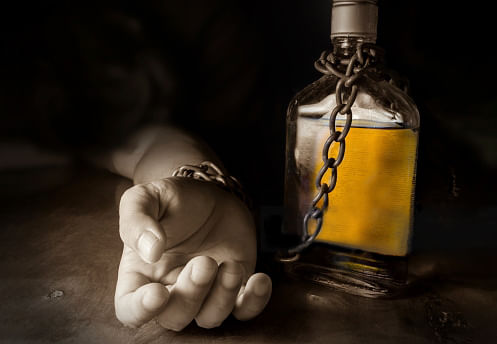|
• Emotional disturbance.
• Poor self-esteem.
• Abuse.
• Guilty feeling.
• Stress and an excuse to forget worries.
• Peer pressure.
• Excessive production of histamine predisposes to alcoholism.
• Hereditary factors.
• Metabolic imbalance.
• Hypoglycemia increases the craving for alcohol.
• Food allergies – sugar, barley, corn, sugar cane, grapes, etc.
• May be vitamin and mineral deficiency.
|
|
• Continual craving for alcohol.
• Cannot drink moderately.
• Unsteady gait.
• Inability to think or any decisions.
• Psychological and social dysfunctioning.
• Obesity.
• Brain damage – memory loss, gait change, speech disturbances, etc.
• Hypertension.
• Hypoglycemia.
– Irritability
– Depression
– Aggressiveness
– Insomnia
– Fatigue
– Restlessness
– Confusion
– The desire to drink and nervousness
• Vitamin and mineral deficiencies.
– Pellagra
– Scurvy
– Anemia
– Osteoporosis
– Night blindness
– Beriberi, etc.
|
|
• Set a daily limit of alcohol and stick to it.
• Control drinking by counting and measuring all the drinks.
• Men should not exceed 2 units of alcohol per day and women should not have more than 1 units. One unit of alcohol is 280 ml beer, 115 ml of wine or 30 ml of spirits(gin, rum, vodka, or whiskey).
• Always eat something while you drink as it slows the absorption of alcohol.
• Avoid missing meals when you drink.
• Avoid people and an environment that encourages drinking.
• Drink slowly and make every second drink a soft drink.
• Never drive after drinking.
• Take a proper well-balanced diet to avoid weight loss and protein deficiency.
• Consume about 2,000 – 3,000 calories a day.
• About 60% of calories should come from carbohydrates especially from fresh fruits, vegetables and grains.
• Protein should contribute to about 15% of the total calorie intake.
• Remaining 25% should come from fats.
|
|
• Alcoholics are found to be deficient in many nutrients; hence a properly balanced diet is essential for recovery and to maintain proper health.
• Most alcoholics are found to be deficient in B vitamins (B2 - riboflavin, B1 - thiamine, B6 - pyridoxine, B9 - folate), food rich in B vitamins should be consumed daily; some B vitamins also reduce the craving for alcohol.
• Consume 400 µgm of folic acid daily, as folic acid deficiency is common in alcoholics.
• Consume a minimum of 1.5 mg of vitamin B2 (riboflavin) daily.
• Increase intake of vitamin B1, thiamine up to 50 mg daily, to correct the deficiency and it helps to treat delirium tremens, alleviate the withdrawal symptoms in abstinence of alcohol and prevents further brain damage.
• Consume 2 mg of pyridoxine (vitamin B6); most of alcoholics are deficient in vitamin B6 as it is destroyed by alcohol. Deficiency can only be corrected if alcohol is completely avoided.
• Increase intake of vitamin B5 (pantothenic acid) to 7 mg daily, it protects the liver from toxic effects of alcohol.
• Consume 500 mg of vitamin B3 (nicotinic acid) daily, reduces craving for alcohol.
• Consume a minimum of 100 mg of vitamin C daily. Vitamin C deficiency can be seen in about 85 – 90 % of alcoholics.
• Increase intake of zinc to at least 15 – 20 mg daily, most of them show low levels of zinc; zinc also reduces the craving for alcohol and also minimizes the toxic effects of alcohol.
• Alcoholics are usually anemic, increase intake of iron-rich food; iron also helps in alleviating the depression and the withdrawal symptoms.
• Alcoholics are severely deficient in magnesium, consume 400mg of magnesium daily, will correct the deficiency and magnesium also minimizes the withdrawal symptoms after cessation of alcohol.
• If you are suffering from any heart or kidney ailments, talk to your physician before making any changes in your magnesium intake.
• Consume food rich in lithium, not more than 500 µg of lithium should be consumed as it is toxic in high doses. Food rich in lithium.
– Eggs, processed meat, fish, milk and milk products.
– Potatoes and vegetables are grown in lithium-rich soil.
• Adequate protein (55 gm daily) intake should be maintained, as alcoholics have difficulty getting enough protein and calories to maintain proper weight.
• Consume 4,000 – 5,000 IU of vitamin A, but do not exceed the intake as vitamin A is toxic in high doses and can cause further liver damage.
• Alcohol interferes with the action of antioxidants such as vitamin C, vitamin E and selenium.
• On cessation of alcohol, these antioxidants are most needed, at least the daily values for these vitamins and minerals. Daily values for vitamin E is 30 IU, for vitamin C is 85 mg and for selenium is 70 µg.
• If you are taking any anticoagulant drugs avoid vitamin E supplements and consult your physician before making any dietary changes.
• Alcoholic are found to be deficient in Gamma-linolenic acid (GLA), it is an essential fatty acid from the omega-6 family. GLA alleviates the withdrawal symptoms, as it is a precursor for the prostaglandin E1. They are found in plant seed oils- evening prime rose, black currant, borage, fungal oils, spirulina (blue-green algae), etc.
• If you cannot get all the required amount of vitamins and minerals from your diet then you can take the multivitamin/ mineral supplement with your physician's advice.
|


+1.svg)
